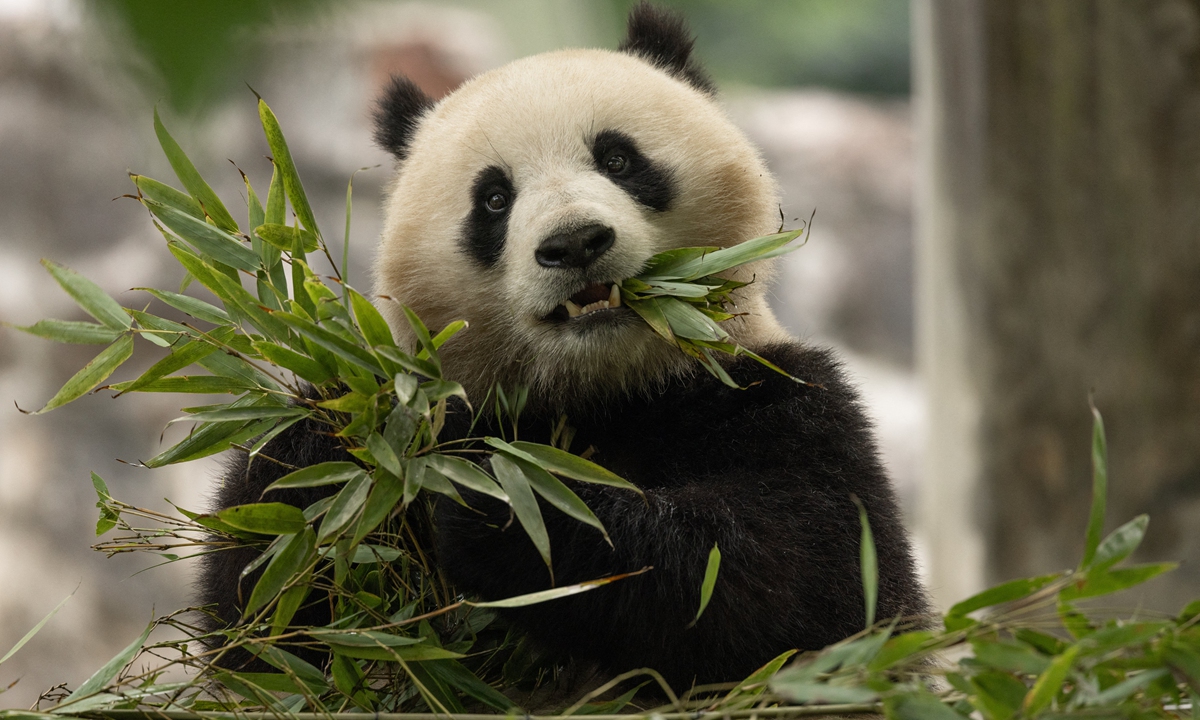
A photo obtained on May 29, 2024 courtesy of Smithsonian's National Zoo and Conservation Biology Institute shows two-year-old giant panda Qing Bao in her habitat at Dujiangyan Base in Sichuan, China. Photo:AFP
According to the website of the Chinese Embassy in the US, the Smithsonian's National Zoo held a media event on Wednesday to announce that it will start a new round of cooperation on panda conservation with China and welcome a new pair of giant pandas, Bao Li and Qing Bao, by the end of the year. This new cooperation carries the hopes of the people of both countries, once again connecting China and the US through pandas.
According to The Associated Press, multiple signs at the Smithsonian's National Zoo read "The Pandas Are Coming!" A staff at the zoo was quoted as saying that "We are super super excited," and "Honestly, we never gave up faith. We knew they were going to come back eventually."
The American people are eagerly anticipating and welcoming the giant pandas to reside in the US. These pandas will continue to serve as "ambassadors" of China-US friendship and cooperation, acting as a bridge between the people of China and the US. They will facilitate cultural exchanges and inspire heartwarming stories between the people of both countries.
Giant pandas have generally helped create positive perceptions of China among Americans. However, some individuals in the US have distorted the image of pandas into a political conspiracy, using them to construct political narratives, Lü Xiang, a research fellow at the Chinese Academy of Social Sciences, told the Global Times. In late 2023, certain US media outlets falsely reported the normal practice of giant pandas returning to China after agreements with overseas zoos had ended as a political maneuver, claiming that "China appears to be gradually pulling back its giant pandas from multiple Western zoos." Their purpose was to insinuate that China was becoming less friendly toward the US-led West.
When the public eagerly hoped for giant pandas to travel to the US, US media viewed giant pandas as a politicized symbol. This reflects, to some extent, the disconnection between the US government and the American people.
The US has repeatedly suppressed people-to-people exchanges between China and the US and often ideologizes cultural exchanges, using them as excuses to discredit China. This is a result of ideological prejudices of Western countries, led by the US, in recent years. Politicizing non-political issues will inevitably harm cultural exchanges and normal bilateral relations between the two countries, said Sun Xihui, an associate research fellow with the National Institute of International Strategy at the Chinese Academy of Social Sciences.
The fact that China and the US will carry out a new round of cooperation on panda conservation continues the decades-long history of the exchange of pandas, releasing hopes for strengthening cultural exchanges between the two countries. The panda is not only a national treasure of China, but also deeply welcomed and loved by people from all over the world, serving as a bridge of friendship. China is willing to enhance collaboration with partners, including the US, on issues such as species protection and cultural exchange. This cooperation has made the voices attacking China and politicizing pandas self-defeating.
People's love for giant pandas knows no national boundaries, touching the softer side of people's hearts and playing a positive role in communication between China and other countries. Lovable giant pandas were once a witness to the improvement of China-US relations; in the future, it is hoped that giant pandas continue to be the "ambassadors" of peace and friendship to the world and China-US cultural exchanges.




